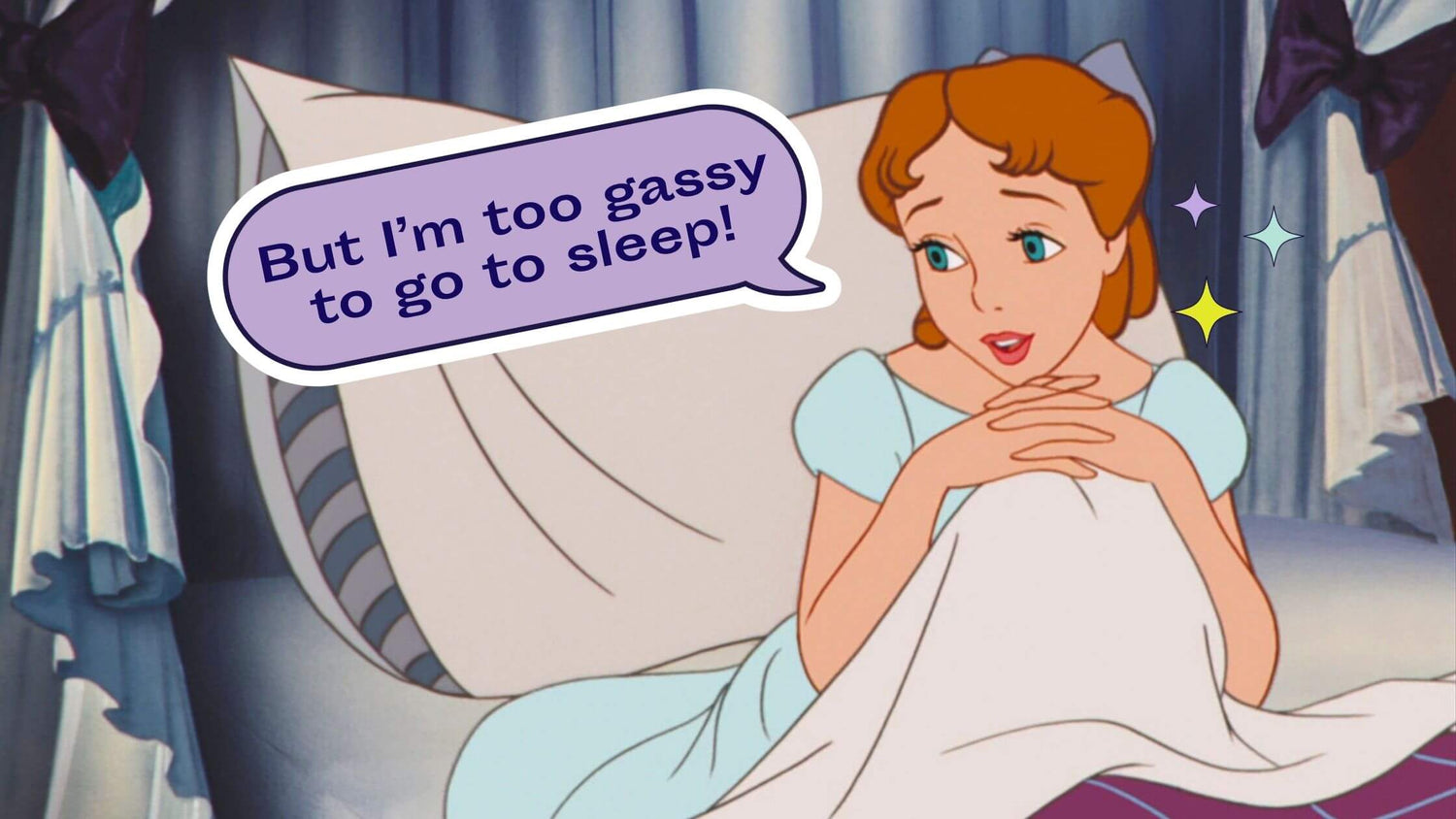Do you find that you bloat more in the evenings compared to the mornings? If so, you are not alone. Many people find that they have great digestion during the day, and as soon as the evening rolls around, they seem to be full of gas.
Evening bloating affects the majority of the population, and it’s often nothing to worry about. However, it can be uncomfortable to deal with. Thankfully, there are lots of things that you can do to improve your digestion, reduce bloating quickly, and experience some gas relief to minimise the evening bloat.
In this article, we are going to look at the symptoms of bloating and the most common causes of evening bloating. We will then cover some helpful tips for minimising or eliminating evening bloat so you can enjoy comfortable and stress-free evenings.
What Are the Symptoms of Bloating?
Evening bloating is characterised by a feeling of fullness or tightness in the abdomen, often accompanied by excess gas (burping and flatulence). If the evening bloat is severe, you might find that you also experience some abdominal pains and cramps.
Although it can resolve on its own, evening bloating can be a challenge to manage. This is especially the case if you are prone to bloating. It might stop you from making social plans and could distract you from work tasks if your job requires you to work later in the day.
Bloating most commonly affects the abdomen. However, you might find that you feel puffy and swollen in other areas of your body when you are experiencing evening bloating. The most common areas of water retention are the ankles, hands, and face.
What Causes Evening Bloat?
There are so many things that can cause you to experience bloating in the evenings. In fact, there are so many that this article would be way too long if we discussed them all! That’s why we’re just going to focus on the most common causes of evening bloating.
Being sedentary
Most of us work during the day and enjoy relaxing at home in the evenings. As a result, we tend to be more active and on our feet in the daytime and a lot less active in the hours following work.
When you’re physically inactive, your digestion slows down. Instead of circulating around your digestive system and improving gut motility, your blood can pool in your lower extremities. In turn, you might find that you get bloated quite easily when you are relaxing in front of the television or on your laptop in the evenings.
Eating a lot of food in a small space of time
If, like many people, you tend to indulge in the evenings, you could be prone to late-night bloating. For obvious reasons, consuming a large volume of food in a short space of time can cause your abdomen to become distended because your stomach and intestines need to expand to accommodate all of this food.
Bloating caused by eating a large volume of food very quickly will disappear after an hour or two as your digestive system breaks down ingested foods and absorbs their nutrient components. However, if you eat a lot of food just before going to bed, you might find that you still feel a little bit bloated and puffy when you wake up. This is because your digestive system slows down overnight when you are asleep and won't break down food as efficiently as it does during the day.
If you prefer to eat close to bedtime or don’t have any other choice due to your work hours, consider taking a probiotic supplement or some digestive enzymes to speed up your digestion and prevent you from waking up bloated.
Our probiotic supplement, A Dose For Bloating, is a great choice for eliminating evening bloating and help digestion. It combines two billion probiotic bacteria with seven digestive enzymes and seven plant extracts for optimal digestive function.
Eating a dinner full of gassy foods
Those of you who love piling your plate up with veggies at dinnertime might find that you feel bloated and gassy after eating. While vegetables are amazing for your health as they contain an abundance of vitamins, minerals, fibre, and antioxidants, they can be a nightmare for your digestion.
The fibres in vegetables are fermented (broken down) by the bacteria in your colon (your gut microbiome), causing the production of gas. This gas can build up in your lower digestive tract and causing post-dinner evening bloating. Gas-producing veggies to watch out for include broccoli, Brussels sprouts, kale, cabbage, onions, and garlic. Other gassy foods include beans and legumes.
Consuming junk foods for dinner
While takeaways, ready meals, and other pre-packaged foods might taste delicious, they are often packed full of salt. Consuming too much salt can disrupt the fluid balance in your body, causing the colon to retain more water and contributing to abdominal bloating.
Similarly, junk foods are high in saturated fats, which can also contribute to digestive discomfort. Tucking into a pizza, burger, or takeaway is okay in moderation when you want to indulge after a long day at work, but it’s likely that you will experience some bloating afterwards, especially if you’re prone to digestive issues already.
Having irritable bowel syndrome
Irritable bowel syndrome (IBS) is one of the most common digestive health conditions, and its main symptom is abdominal bloating. There are several hypotheses for the cause of IBS, but regardless of the reason for your condition, you’re probably no stranger to digestive discomfort.
If you have IBS, your body digests food less efficiently and you might be extra sensitive to certain nutrients and compounds, such as gluten. Eating these compounds could exacerbate bloating, gas, and abdominal cramping, making your evenings a lot less enjoyable.
Fatty foods, spicy foods, beans, legumes, and artificial sweeteners are also known to worsen IBS symptoms, so if you eat any of these foods at dinnertime, it could lead to evening bloating.
Being dehydrated
When you’re watching television or enjoying an evening with your loved ones, it’s easy to forget to stay hydrated. You might forget to grab a glass of water, or you might be drinking alcohol instead. Consuming alcohol can cause you to become dehydrated if you’re not careful because it stimulates your bladder and causes you to go to the toilet more often.
Dehydration can cause water retention in the lower digestive tract, leading to evening bloating and discomfort. You’re particularly prone to dehydration if you’ve eaten a salty dinner, too, as sodium draws water out of the body.
Not eating enough dietary fibre
Fibre is essential for healthy digestion. It fuels the beneficial probiotic bacteria in your gut, enabling them to support the breakdown of foods and reduce the risk of digestive disorders. It also improves the passage of food through your colon and softens the stool, making it easier to pass.
So, if your evening meals are low in fibre, you could be setting yourself up for an evening of bloating and abdominal discomfort.
Liver disease
Liver problems can cause a range of gastrointestinal symptoms. Almost half of all liver cirrhosis patients report experiencing abdominal bloating, around one in every four get abdominal pain, and between eight and 19% report belching, diarrhoea, or constipation.
While it’s unlikely that evening bloating is the only symptom you will experience if you have serious liver disease, it’s an important thing to be aware of. If you’re concerned or you are getting additional symptoms of liver disease, such as jaundice or itchy skin, speak to your doctor for medical guidance.
Being on (or almost on) your period
The rise in oestrogen and progesterone that occurs just before your monthly period can cause increased water retention throughout the body, including in the gut.
Fluctuations in reproductive hormones are completely natural and healthy. However, because of these fluctuations, you might find that you’re more prone to evening bloating and other digestive symptoms in the days leading up to your period and during your period itself.
What Can I Do to Avoid Bloating in the Evening?
Those of you who experience the dreaded evening bloat will be glad to hear that there are lots of effective natural remedies for bloating and gas relief. We’ve covered some of the best bloat-busting strategies for you to try below.
1. Drink more water
Your body will thank you for improving your digestion when you provide it with enough water. You’ll keep your gut bacteria happy and minimise water retention to keep evening bloating at bay.
The general recommendation is to consume around two to two and a half litres of water a day. However, it’s not always easy to measure how much you’re drinking. We recommend simply taking sips of water at regular intervals throughout the day and paying attention to when you start getting thirsty. Thirst is the first sign of dehydration, so drinking water as soon as you notice this symptom is key to staying properly hydrated.
2. Drink less tea, coffee, and alcohol
At the same time as increasing your water intake, minimise your caffeine and alcohol consumption. Both of these substances can increase your urine output, contributing to dehydration and bloating.
If you’re a self-confessed coffee addict or you enjoy indulging in a glass of wine after work, don’t worry! You can still enjoy your favourite drinks. Just make sure to top up with some extra water to stay hydrated and maintain optimal digestion as you age.
3. Spread your meals more evenly throughout the day
Instead of saving all of your calories for the end of the day and eating a huge evening meal, try to spread your calories more evenly throughout the day. Eating a slightly larger breakfast and lunch will mean you’re less hungry at dinner time and are less likely to overeat. In turn, you’re less prone to getting bloated and gassy in the evenings.
4. Make healthier food choices
As much as we all love a takeaway every now and then, they’re not the healthiest of choices. They’re packed full of salt, saturated fat, and sometimes sugar, none of which are beneficial ingredients for your gut. By cutting back on your intake of takeaways and junk foods, you can improve your digestive health and even eliminate evening bloating altogether.
Instead of ordering a takeaway after work, find a healthy recipe to try. Search for a recipe that’s full of protein, vitamins, minerals, fibre, and antioxidants that will fuel your gut microbiome and provide your body with the essential nutrients it needs to thrive. Doing so will relieve your digestive symptoms so you can enjoy relaxing evenings at home without worrying about your gut.
In particular, find recipes for dishes with high amounts of potassium and magnesium to promote better fluid regulation and toilet regularity. Foods that are loaded with potassium include sweet potatoes, white potatoes, leafy greens, white beans, beets, and avocados. Magnesium-rich foods include leafy greens, whole grains, nuts, and seeds.
5. Go for an evening walk
Walking after dinner is a great way to keep things moving in your digestive tract and improve gut motility. Even a quick ten-minute walk around the block can do the trick! You’ll find that adding a short post-dinner walk to your evening routine will reduce evening bloating significantly.
These additional daily steps will also support you in achieving your health goals, whether you want to maintain your current fitness level, improve your cardiorespiratory endurance, or lose weight. Consider taking your dog out with you (if you have one) for moral support or roping your partner into coming along for the walk to make it a little more interesting and enjoyable.








